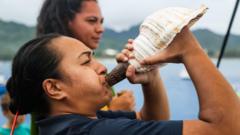With a rich tapestry of cultural heritage and pristine landscapes, the Cook Islands now find themselves at a crossroads as plans to mine the sea floor for polymetallic nodules gain traction. These nodules, rich in cobalt, nickel, and manganese, are essential for the production of batteries that power everything from electric cars to smartphones. However, the proposed deep-sea mining operations come with significant controversy.
Jean Mason, curator of the Cook Islands Library and Museum, offered a glimpse into how these minerals could reshape the nation’s future. She recalls a time when these nodules were merely thought to hold value for tools, long before modern technology rendered them a lucrative target. For Prime Minister Mark Brown, who champions the mining operations, the potential benefits are clear. The income generated could provide unprecedented financial resources for education, healthcare, and infrastructure development, which are much needed in these remote islands.
While proponents like Mason argue for swift action, environmental activists voice serious concerns. They fear that exploiting these underwater resources could wreak havoc on the fragile marine ecosystems and threaten the very ocean that supports their livelihoods. This fear becomes more palpable as rising sea levels and climate change continue to pose existential threats to low-lying island nations.
Alanah Matamaru Smith from the Te Ipukarea Society, an environmental group in Rarotonga, emphasizes the need for thorough research before moving forward. Activists and community members are calling for a moratorium, insisting that the potential risks of deep-sea mining demand a more thorough understanding before proceeding with what they see as an irreversible decision.
Government officials assert that they are proceeding with caution. Hans Smit, who leads one of the licensed mining companies, points out that all resources carry risks, and current lifestyles demand trade-offs. Rima Brown, a Cook Islander working with the Seabed Minerals Authority, describes the ocean resources as vital for the future, underscoring the nation’s identity as a large ocean state.
Despite the government’s optimistic approach, skepticism remains, particularly among residents of the outer islands like Mauke. Activist June Hosking urges her community to confront the complexities of deep-sea mining discussions, noting that not everyone feels comfortable speaking out. She emphasizes the critical need for open dialogue about their future, pushing back against the notion of sitting neutral during such a transformative time.
As the Cook Islands navigate their path forward, they grapple with profound questions about balancing economic growth and environmental stewardship. The decisions made today may not only impact the livelihood of the current generation but will shape the legacy for future islanders. The deep-sea mining debate is far from solved, and the voices of the community will play a crucial role in determining the outcome as they strive for a sustainable future.
Jean Mason, curator of the Cook Islands Library and Museum, offered a glimpse into how these minerals could reshape the nation’s future. She recalls a time when these nodules were merely thought to hold value for tools, long before modern technology rendered them a lucrative target. For Prime Minister Mark Brown, who champions the mining operations, the potential benefits are clear. The income generated could provide unprecedented financial resources for education, healthcare, and infrastructure development, which are much needed in these remote islands.
While proponents like Mason argue for swift action, environmental activists voice serious concerns. They fear that exploiting these underwater resources could wreak havoc on the fragile marine ecosystems and threaten the very ocean that supports their livelihoods. This fear becomes more palpable as rising sea levels and climate change continue to pose existential threats to low-lying island nations.
Alanah Matamaru Smith from the Te Ipukarea Society, an environmental group in Rarotonga, emphasizes the need for thorough research before moving forward. Activists and community members are calling for a moratorium, insisting that the potential risks of deep-sea mining demand a more thorough understanding before proceeding with what they see as an irreversible decision.
Government officials assert that they are proceeding with caution. Hans Smit, who leads one of the licensed mining companies, points out that all resources carry risks, and current lifestyles demand trade-offs. Rima Brown, a Cook Islander working with the Seabed Minerals Authority, describes the ocean resources as vital for the future, underscoring the nation’s identity as a large ocean state.
Despite the government’s optimistic approach, skepticism remains, particularly among residents of the outer islands like Mauke. Activist June Hosking urges her community to confront the complexities of deep-sea mining discussions, noting that not everyone feels comfortable speaking out. She emphasizes the critical need for open dialogue about their future, pushing back against the notion of sitting neutral during such a transformative time.
As the Cook Islands navigate their path forward, they grapple with profound questions about balancing economic growth and environmental stewardship. The decisions made today may not only impact the livelihood of the current generation but will shape the legacy for future islanders. The deep-sea mining debate is far from solved, and the voices of the community will play a crucial role in determining the outcome as they strive for a sustainable future.





















